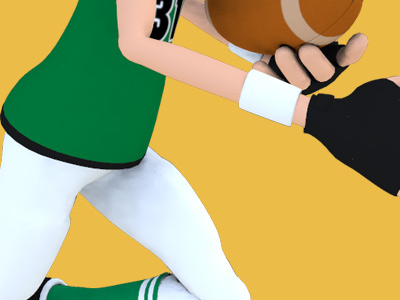American football

Delay of game
Delay of game is an action in a sports game in which a player or team deliberately stalls the game, usually with the intention of using the delay to its advantage. In some sports, the delay of game is considered an infraction if it is longer than that permitted according to the game's rules, in which case a penalty can be issued. Some sports that have a delay of game penalty are American football, Canadian football, ice hockey and association football.
American
In American football, an offensive team is penalized five yards for delay of game if it fails to put the ball in play by either snap or free kick before the play clock expires. This time limit varies by league, and is often 25 seconds from the time the referee signals the ball ready for play. In the National Football League, it can also be 40 seconds from the end of the previous down, depending on the circumstances at the time. Also, the defensive team can be given the same penalty if they fail to quickly yield the ball to officials after a play has ended, prevent a player on the offense from getting up after the play, or kicking the ball.
Canadian
In Canadian football, the term "delay of game" is used for a different type of foul. On kickoffs, it can be called against the kicking team for failure to put the ball in play within 20 seconds of the referee's signal. At other times in the game, it can be called against the defensive team for interference with the placement of the ball after it is declared in play by the referee. In both cases, the penalty is 10 yards from the previous spot.
The foul known as "delay of game" in American football is called "time count" in Canada. It is generally identical to the American foul, with two important exceptions. First, Canadian football only allows the offensive team 20 seconds from the referee's signal to put the ball in play, as opposed to the longer periods allowed in the American code. Second, the penalty, which is identical to that in the American code during most of the game, including convert attempts at any time, is dramatically different after the Canadian code's three-minute warning near the end of each half. After the three-minute warning, the base penalty becomes loss of down on first or second down, instead of the regular 5 yards. On third down (the final down that the offensive side has to gain a first down), the penalty becomes 10 yards with the down repeated. The referee also has the right to give possession to the defensive team if he deems repeated time count violations on third down to be deliberate.
SPORTS



American Football
Game play in American football consists of a series of downs, individual plays of short duration, outside of which the ball is dead or not in play. These can be plays from scrimmage – passes, runs, punts, or field goal attempts (from either a place kick or a drop kick) – or free kicks such as kickoffs and fair catch kicks. Substitutions can be made between downs, which allows for a great deal of specialization as coaches choose the players best suited for each particular situation. During a play, each team should have no more than 11 players on the field, and each of them has specific tasks assigned for that specific play.
Rules and gameplay
- Scoring
- Maneuvers
- Strategy
- Play types
- Penalties
- Turnovers
- Downs
- Teams and positions
- Field
- Equipment
- Duration and time stoppages
- Advancing the ball and downs
- Kicking
- Officials and fouls
Positions
Offensive (Interior) line
Backs and receivers
Defensive line
Linebackers
Defensive backs
Special teams
- Kicker (K)
- Holder (H)
- Long snapper (LS)
- Punter (P)
- Kickoff specialist (KOS)
- Kick returner (KR) and Punt returner (PR)
- Upback
- Gunner
- Jammer


RESOURCES
This article uses material from the Wikipedia articles "American football", "American football rules", "Penalty (gridiron football)", "Delay of game", which is released under the Creative Commons Attribution-Share-Alike License 3.0.
© Stories Preschool. All Rights Reserved.





